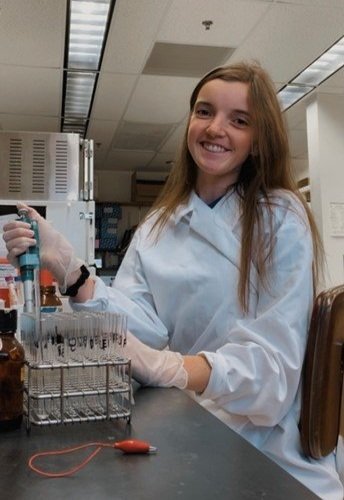Rebecca Caldbeck, Biotechnology in Animal Nutrition
Rebecca Caldbeck
Royal DSM Nutritional Products
Job Summary
I am currently an Asset Technology Intern for Royal DSM Nutritional Products in Winchester, Ky. The facility is a pilot plant that supports both scaling up of new research and development projects as well as improvement of current industrial scale processes. Daily, I get the opportunity to perform wet lab work, aggregate and analyze data, participate in quality audits, review current research literature, and join on-site planning meetings. Every day is as unique as the team I get the pleasure to work with, which consists of a diverse group of scientists and engineers.
Why did you decide to study agriculture biotechnology?
Leaving my home country of Ireland behind at age five, my family settled in western Kentucky, where I quickly developed an insatiable captivation with the vast natural world of my new home, eventually deepening to the molecular level. My passion for STEM (science, technology, engineering, and math), specifically biotechnology and environmental science, extends far into my roots, as both familial lines hail from agrarian backgrounds.
Throughout my childhood, I found great joy in experimenting with the power of nature - much to my parents’ amusement and (naturally) occasional disdain - like when, as a six- year-old, I replaced our family laundry detergent with a custom-brewed, plant-based mixture of dock leaves and soil that I had concocted to help “improve” cleaning power. Though not everyone shared in the excitement when my experimental detergent was added to the washer, clearly a rival of Tide, my fascination with inventing and improving wasn’t ever stifled, and for that I am grateful. This was just the start of my interest in harnessing the power of our natural world for improvements in agriculture, nutrition, and energy through biotechnology.
How did your college/work experiences shape the job you have today? What was your path?
I obtained dual bachelor’s degrees in ‘Agricultural and Medical Biotechnology (ABT)’ and ‘Natural Resources and Environmental Science (NRES)’, as well as a certificate in Fermentation and Distillation Technology. Through undergraduate research experiences, I developed a deeper sense of appreciation for the scientific process through a myriad of independent and team-focused projects. My current internship successfully combines all my interests. With my perpetual hunger for continuous learning, after the conclusion of my yearlong internship with DSM, I plan to pursue a PhD, to aid in propelling my curiosity in environmental biotechnology forward. My long-term goal is a career in industry research and development, hence I felt that an industry-focused gap year prior to grad school would provide a focus and surety in my proposed path.
Explain the skills (learned or soft) you need to accomplish your job.
My varied experiences as an undergraduate researcher equipped me with knowledge in biochemical processes and analytical equipment skills necessary to perform precise work in the lab and field. My experience as an agricultural analysis lab Co-Op honed my abilities for sample processing and data analysis/management, while my previous work as an office assistant and seed variety technician provided me with excellent documentation skills invaluable in research settings. I served on the executive board of both Agricultural and Medical Biotechnology Club, in addition to the Energy Club at the University of Kentucky, where I effectively collaborated with people of various backgrounds, an essential part of my current position.
What is your favorite part about your job? Most interesting?
I love getting hands on experience with solving real world problems and getting to see applied science in action. I’m very interested in DSM’s use of fermentation for sustainable production of a variety of products.
What advice would you give a young person looking at this career?
I recommend getting involved in scientific research as early as possible. It is a highly rewarding opportunity that both solidifies and expands upon in-class experiences, as well as develops valuable analytical skills. To join, students can reach out directly to a professor of interest, explaining what it is that excites them about the research and inquire about availability for student positions. I would also encourage students to apply to summer research programs. These are offered by many universities as well as private organizations. Any work experience outside academic research is also advisable when applying for careers in industry. Don’t be afraid to explore outside of your interest areas, as this will strengthen and expand your understanding of the larger scientific community and may provide new outlets for your curiosity.

